- Home
- Brian Hodge
The Convulsion Factory Page 11
The Convulsion Factory Read online
Page 11
I was very suspect in Camilla’s eyes anyway, because when she first moved in and we were getting the obligatory personal trivia out of the way, I told her mine, that I printed T-shirts for a living, but that I had a journalism degree, although what I really wanted to do was write fiction.
“I despise modern fiction,” she said, suddenly frosty. “The only reason people read it is because it makes them feel better once they’ve assured themselves that everybody else’s lives are just as vapid as their own.”
It was then I learned that Camilla took refuge in nineteenth-century literature. Jane Eyre was, I think, more real to her than I was. And I hadn’t written a word since she had leveled what I’d finally come to believe was my reason for existence.
Naturally this led to the realization that my conception and birth were tragic mistakes. This was no exaggeration. I’d had the temerity to be born indecisive in an age when we’re all defined by what we do, our titles and our job descriptions. Once I’d taken a good look back at everything I’d ever really wanted to be, things became very clear.
When I was eight I wanted to be a cop. TV had a lot to do with that one, I suspect. In my early teens I argued so much that my mother told me I’d make a fine lawyer, and I actually took this to heart, because there had to be truth in anything that caused her so much spite. Later, by default more than anything, I settled into courses in journalism, because being a reporter seemed one of the more non-committal directions I could take.
In looking back, I realize that everything I used to think I wanted to be when I grew up, it’s turned out that people scorn them now. Thanks to Camilla’s critique, even my dreams were vapid.
Medical school cadaver. It had possibilities.
*
Early in my college career, my father grew loudly exasperated by my inability to declare a major. By this time he and my mother were divorced, each of them militantly, bitterly opposed to being subsumed by the memory and loss of the other. They spent lots of money and made themselves miserable, each conspicuously trying to prove to the other just how happy they were to be free.
If someone had sent me to the encyclopedia to look up Hell, I just knew I’d find a flow-chart of their relationship.
And there I was, the boy who didn’t know what he wanted to be, only that he’d once wanted to do it with breasts. I’m sure to my father I was the world’s great blemish on the Y-chromosome.
“Aw, christ, why don’t you be a meteorologist?” he suggested in disgust. “There’ll always be weather. You’ll always have a job.”
Security was terribly important to him.
I thought this over, but just couldn’t get past what I’d been hearing from scientists, all this dire talk of a coming Ice Age. I worried that I’d be on TV and that everyone would start to hate me, because there I’d be, standing before a chromakey display that read Tomorrow’s Forecast, and I’d have to look them all in the eye and say, “I’m sorry … umm … more ice.”
So it’s just as well.
I guess my father didn’t lie to me — there really is always weather — but then, that still wasn’t enough for the weatherman, was it?
Dad always could get off on a technicality.
*
So that suicide thing was working at me, like a Rubik’s Cube, or the pretty rock paperweight you pick up and turn over and over in your hand when there’s nothing better to do.
I became a student of methodology whenever I saw some sort of mention in the paper, but few of the guaranteed, no-miss techniques appealed to me, because mostly they were very messy without the redeeming grandeur of the weatherman’s nosedive. Most of my housemates I didn’t want to burden with the grim task of cleanup, and there was no way of insuring that it fell to Camilla alone. That I could’ve lived with.
I wondered if it might not be easier to contract some hideous disease — surely Syd and Brendan could qualify the symptoms — then summon Dr. Kevorkian. I pictured his arrival like that scene from The Exorcist when Father Merrin finally shows up to battle the devil, standing still in black silhouette beneath the streetlight in front of that foreboding house, his mysterious and holy bag in hand.
And then my thunder got stolen again.
When Nirvana’s Kurt Cobain put the shotgun in his mouth and thumbed the trigger, it sent shock waves through our house. All of us, even Camilla, would look at each other as if we’d been living a movie and one of the reels of film got put in upside-down, or out of sequence. It felt as if we were all on the verge of saying, “No, wait, it’s not really supposed to be like this.”
And it wasn’t. The weatherman, now he’d been a frat boy. He was supposed to turn out miserable and hollow at the center of it all. But this was something else entirely. Kurt had done it all his way and flipped everyone the bird from his breakthrough album, and it still wasn’t enough, so what chance was there for the rest of us?
Oh … never mind.
We left MTV on all weekend, saw the same varnished newsreels until we could’ve recited them by rote, and I don’t know that we were grieving so much as we were simply horribly justified. We’d come of age, an entire demographic group of us, from Seattle to Key West. We finally had our JFK — where were you when you heard the news? — and no, he wasn’t in the same league, but he was ours.
By early the next week my T-shirt shop had already coughed up its paean to tastelessness and commemorative gallows humor, and I brought home a half-dozen prototypes of the shirt. In a rare era of unity, all six of us wore them that night, black shirts with a picture of Kurt on the front, thick stringy gobs of red and gray ink blasting furiously from the top of his head, and above this it read:
nirvana [noun]: The state of perfect nothingness
We liked to think Kurt might’ve at least appreciated the irony. Especially since Megan looked the word up in Webster’s and found that nirvana literally meant, in Sanskrit, “blown-out.” Some things you just can’t make up.
So we wore our shirts and later got bold, maybe masochistic, and flipped on Rush Limbaugh. It really was quite astounding, the authority he’d become on Kurt, considering until a few days before he’d never heard of the guy. We watched Rush chortle and bluster his way through a denunciation of nearly everything that was under thirty and not Republican. A bunch of lazy whiners who’d had everything handed to us — yeah, so what’s your point? We all sort of knew we couldn’t do anything right, but I’d always thought that that’s the sort of judgment you prefer to reserve for yourself.
“He’d been trying to kill himself for twelve years,” said Rush. “He finally had to buy a shotgun so he wouldn’t miss.”
“Well at least he didn’t have to buy a goddamn airplane!” I shouted at the TV, and couldn’t recall feeling quite so cranky in years.
It was an epiphany, glorious and violent. For the first time in maybe forever, I wanted somebody to be dead, and it wasn’t me.
“You know how they used to execute horse thieves?” I said, not caring who was listening and who wasn’t. “How they used to tie one leg to a northbound horse, and the other to a southbound, and fire a gun?”
“Make a wish,” said Pam.
“I’d really like to do that to him.” I jabbed at the round, jack-o-lantern face on the TV. “Label one horse’s ass ‘Dad’, and the other one ‘Mom’, and just see how well he handles that.” I really started to cook then. “And maybe a couple more horses for his flabby arms, too. And another one for his big fat neck. Label those ‘truth’, ‘liberty’, and ‘the pursuit of happiness.’”
They were all staring at me. Even Rush, but I’m sure that was just a fluke of timing. And I burned with the fury. It was the Gettysburg Address and the Sermon on the Mount and Henry V’s rally of his troops at Agincourt. Well, to me it was.
They all knew I was alive then, and oddly enough, so did I.
I slept with Megan that night, and it didn’t seem nearly the mistake I was convinced it would be. And then dawn came in on the songs of birds as I looked
at her, her black hair bunched upon the pillow, thick enough to tie a cable, a lifeline. Not a noose.
“Morning,” she murmured, with a smile, and I wondered how many others across Chicago and the rest of the country were waking up alone, knowing with prophetic certainty that they always would. I imagined they must number in the millions. And of those I had to wonder how many listened to Kurt’s music and thought he’d written it just for them, or fantasized of sitting beside the weatherman to share that fragile cockpit’s ultimate dive.
They deserved a voice, at least.
“Can I borrow some money?” I asked Megan, and she didn’t even ask what it was for, just said sure.
*
In the colorful and tragic circus after Kurt’s suicide, when it seemed that everyone with a forum, an agenda, and a vocabulary had to say something, I was surprised that no one mentioned Ernest Hemingway. Three decades plus change lay between their deaths, but I would imagine shotgun shells taste the same, no matter what their vintage is.
Kurt left a note, told his wife and the world he didn’t have what it takes anymore, that he couldn’t fake it.
Then, thirty-some years before, you had Hemingway, up in years like he never really wanted to be. Couldn’t fight any more, couldn’t fuck. Prostate trouble, too, if the gods were feeling particularly vicious. I don’t know if he left a note or not, but even if he didn’t, he really hadn’t needed to. It was all there in the books to begin with.
And there you have them, two influential artists with their own singular visions, lives gone, their motives as clear as their demises, and still no one understands. They’re all too busy crying foul to pay attention.
So I ask you: What chance does the average underachiever with a death wish have of being understood?
I went my own way the next several days, placid through my angers. Didn’t bother watching the forecasts. Rain or clouds or sun, I’d gotten to the place where I preferred the surprise to the tipoff. Then the next round of free weekly papers came out, the ones you find at all the better bars and bookstores and coffee shops. The ones whose deadlines I’d caught after borrowing from Megan. I swept down on them and brought home one of each. Sat on the couch as the ebb and flow of life went on under our mad roof, browsing the classifieds until Megan came home.
“I’m writing again,” I told her. “I wanted you to be the first to know.”
“Are you really?” She seemed very happy to hear this, and she was so decent, you know, she didn’t even say the obvious. Oh yeah, well how about writing me a check sometime soon?
“I’m putting together a portfolio,” and then I handed her one of the papers, folded back the way my father always read them, and left them for the next person. I showed her where to read, my ad under “Special Services.”
SUICIDE NOTES
FOR ALL OCCASIONS
• Don’t waste that last opportunity to have your say … you’ll never get a better chance to explain.
• Custom-written just for you, or choose from among our many demos.
• Blame laid, guilty consciences eased, more.
And on it went, with my evening number and suggested hours, but of course I realized I’d have to be flexible. Emergencies do come up.
“That’s morbid,” said Megan. “But I admire your ability to find a niche.”
“Most people need help just writing a resumé,” I said, and she nodded, remembering. I’d helped her write one two weeks after I’d moved in.
And for all the days of soul-searching, I actually felt good about this. It could prove to be a valuable service, one less thing to worry about at a really shitty time. Making money off the misery of others? I didn’t think of it as selling out. I preferred to think of it as buying in. I’d been there, could relate.
Eagles do fly higher than vultures, but at least they both get off the ground. After that, what really matters?
Megan and I curled into the couch, and then each other, and we talked until the phone started to ring, and once it started, I wondered if it would ever ever stop.
Heartsick
i. need
The wet spot is still on the bed when they retreat, come first light of morning, or sooner. After she sees the last of their backs out the door there is plenty of room in the bed, but still she sleeps atop the wet spot. Cool beneath her, sticky to the touch. Beneath her hip sometimes, other times her back … perhaps even her shoulders, depending on earlier acrobatics.
Awake and dreaming, tracing fingers through that dewy patch, their mingled fluids — mostly his, the ever interchangeable he — and she brings its musk scent to her nose. Then dips her nose to the source itself, breathe deeply now, as if to swim in their communal pool. Or duck beneath and drown.
The wet spot is still fresh when they leave.
But Stefan is different.
Connie, awake and dreaming, all nude and half covered by the rumpled sheet. The visible breast is small, firm, pointed. Her hair still crimped and now in stiff clumps, last night’s mist having lost its hold like so much surrendered self-control. And will she cry? No, no more, at least that’s one benefit of lowered expectations.
Two can play the game, gender being no barrier, affirmative action and equality: I can be just as callous as you, bastard, and if we were at your place instead, you couldn’t keep me from that door. Just you try.
Sure. Sure.
Just try, once, just … once?
Connie smiles dimly at the ceiling with lips that recall the press of another’s. Oh, the places she’s put her tongue. In retrospect it’s probably best she never sees them by true daylight; the night adds so much more mystique. In the dark, anything can dwell, any promise hold a core of truth.
Fan above, blades of wood and cane, slow circles for a draft to cool moonlit sweat, flesh on flesh, ghost white on silver. And if this ceiling could talk, what 3AM murmurs might it have learned, parrot-fashion?
i don’t usually do this, really i don’t … but it was your eyes i think
don’t you hate that smoke smell, so do i, isn’t this better?
your hands, i love the way your hands feel, i need them here
i love to give head
i’ll do anything you want
need them here too
okay? okay?
walk your dog now? i thought you said earlier you didn’t have any pets
Sometimes these exchanges seem as rehearsed as they are spontaneous, and probably this is so. Identical players memorizing identical scripts of hunger and desperation and pathological fears of loneliness, endlessly played out by new pairings of performers. On interchangeable stages.
But Stefan is different.
Endeavoring to persevere, Connie has tried pursuit, a follow-up of the heart once the ice of loins has been broken. Pop-psych gurus, “Don’t be afraid, men are flattered when the woman takes the initiative,” and now she has a whole shelf filled with pastel paperbacks she’d just love to cram down the throat of the next self-appointed expert. Here you go, digest this and see how it correlates with actualities out there, see if you can look me in the face then.
And then…?
…maybe I’ll buy your book anyway. It can’t hurt. Can it?
Taking the initiative, she knows all about that. Connie knows romance. Knows her heart and her soul, knows that fairy tales really can be hammered out of them with enough force.
The catered lunch at Andy’s office, address right there via Tuesday night’s exchange of business cards — are you surprised? she asked, flushing with obvious pleasure, and yes, oh yes he most certainly was, then had a question of his own, and her face began to crumble like a broken mask. connie. connie martin? we met … the other night, we … um… Standing unprotected in a strange office she’d never seen before, and how brutal the air suddenly felt in her throat, on her eyes, peripherally aware of the caterer in his white jacket, starting to squirm and shuffle his feet and refusing to look up any more. She supposed it was his idea of discreet pity. Share her emb
arrassment and maybe he gets a bigger tip.
Overpriced luncheon, trout almandine, taken home in the world’s most humiliating doggy bag. White wine half-drunk in the taxi, one batch of leftovers eaten in front of evening TV news and quickly thrown up into the toilet, the other shoved to the back of the fridge until it grew blue mold. So much for romance.
She’s far wiser these days. Lapsing occasionally, still that hunger for another, deeper, voice to reassure her of beauty, of desirability, even if it is calculated for short-term goal attainment. But overall, preferring to stick with the certainty of lowered expectations and its attendant sure thing. That guarantee of no abrupt abandonment.
Stefan has brought that much into her life, at least.
ii. desire
Connie knows she’ll not get back to sleep, not now. With barely an hour left before the alarm and shower and curling iron and work, it’s hardly worth the effort.
She rises, doesn’t bother with the robe hooked on the back of her bedroom door. Carpet soft beneath her feet, and then she’s in the hallway, varnished wood suddenly and pleasantly cool. She lies naked out here some mornings, stretches herself along the bare hallway floor like a scrawny cat in a windowsill. Ever the sensualist, tender skin soaking the night’s chill from rigid floorboards. Although this summer she doesn’t do it nearly so much as she used to.
Not since Stefan. Aesthetically, he and the morning floor have so much in common.
Down the hall to the second story’s other bedroom, she’s known all along she would be coming here this morning. That gentle ache inside, something left untouched earlier, some hollow unfilled. Some flower ignored.
Stefan waits on the bed, flat on his back, as always, and she draws down the sheet that modestly covers him. Never speaking in moments like this. With her eyes there is no need, and he has long since lost the ability. He’s limited to the occasional soft, low grunt. She’ll speak to him afterward, when it’s more meaningful. He will appreciate it more then, she’s sure of it.

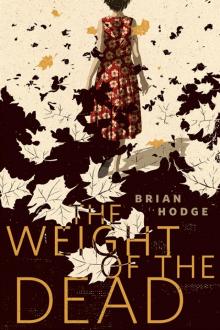 The Weight of the Dead
The Weight of the Dead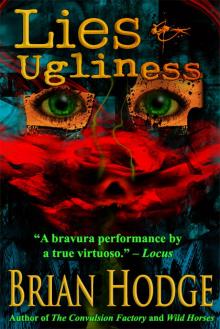 Lies & Ugliness
Lies & Ugliness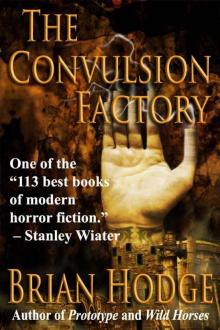 The Convulsion Factory
The Convulsion Factory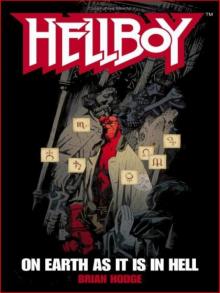 Hellboy: On Earth as It Is in Hell
Hellboy: On Earth as It Is in Hell Whom the Gods Would Destroy
Whom the Gods Would Destroy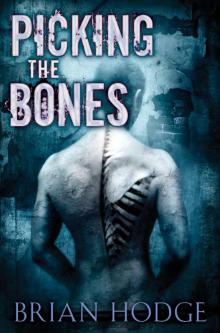 Picking the Bones
Picking the Bones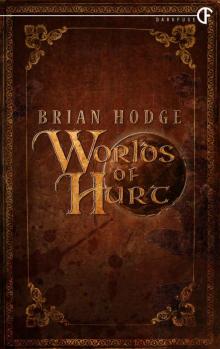 Worlds of Hurt
Worlds of Hurt Oasis
Oasis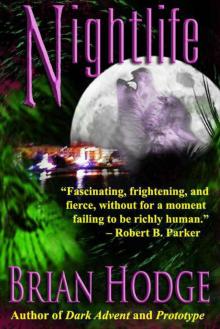 Nightlife
Nightlife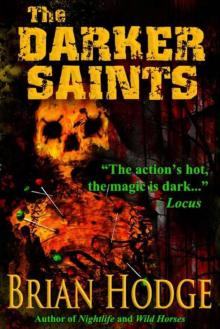 The Darker Saints
The Darker Saints Just Outside Our Windows, Deep Inside Our Walls
Just Outside Our Windows, Deep Inside Our Walls A Haunting of Horrors, Volume 2: A Twenty-Book eBook Bundle of Horror and the Occult
A Haunting of Horrors, Volume 2: A Twenty-Book eBook Bundle of Horror and the Occult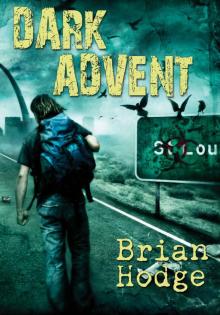 Dark Advent
Dark Advent Mad Dogs
Mad Dogs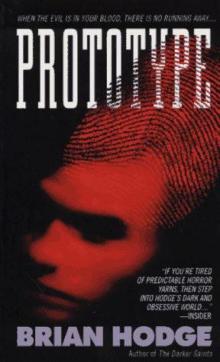 Prototype
Prototype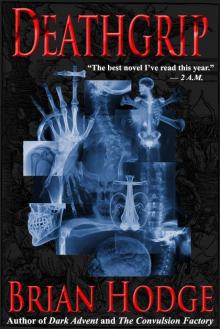 Deathgrip
Deathgrip Falling Idols
Falling Idols